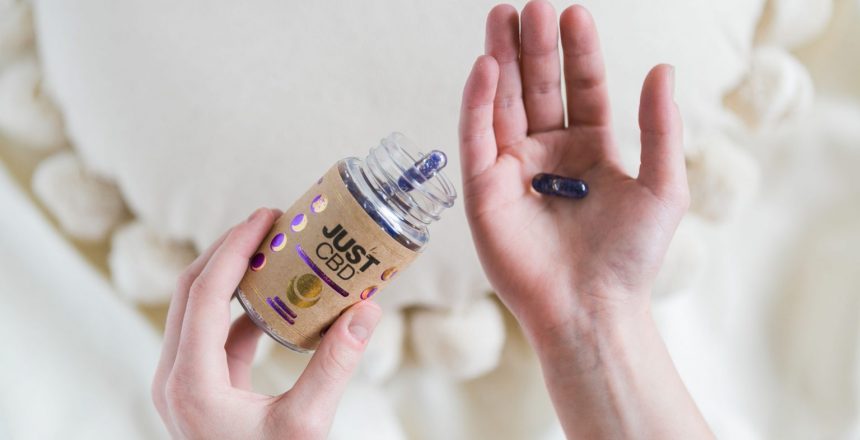CBD capsules are seen as a convenient way of taking a precisely measured dosage of CBD. Just like their CBD oil counterpoints, there are many varieties and numerous things to look out for when making your purchase. So here we will discuss the pros and cons to help you make a more informed choice.
Absorption
Aside from form, one of the main differences when consuming CBD in a capsule form, is that it takes longer for the body to absorb. This is as a result of the CBD having to pass through the digestive system first. CBD oils on the other hand, enter the bloodstream directly via sublingual application (i.e. under the tongue), thus in part avoiding the digestive process. However, once absorbed CBD taken in a capsule format should produce a similar effect as their CBD oil counterparts, all things being equal.
Convenience
One of the main advantages with CBD capsules is their convenience. This method offers a very quick and hassle-free way to add CBD and other cannabinoids to your daily routine. Providing the capsule remains intact, there is no chance of any messy accidents. This cannot be said of CBD oils, in particular when incorporating a dropper delivery method.
Ease of Dosing
Another advantage with capsules is their ease of dosing. Droppers are fiddly and being able to accurately dose using this method in particular can be fraught and unreliable. It is very easy to take too much or too little. Spray options are easier than droppers though there is the potential for them to clog if the nozzle gets debris on the outside.
Capsules Have No Taste
For anyone that does not like the taste of CBD oil, capsules offer the significant benefit that they have virtually no taste. Some people find the taste of CBD Oil bitter and unpalatable and in some cases, the carrier oil can produce acid reflux.
Types of Capsules
Soft Gel
There are two main forms of CBD capsules you can take: soft gel and hard shell. Soft gel capsules are nearly always made from gelatine – which is derived from animal tissues – and a plasticiser such as glycerine or sorbitol, which makes the capsule soft and pliable. An advantage with soft gel capsules is that due to the manufacturing process, they are hermetically sealed, so they will not leak unless they sustain heavy damage. However, they are usually more expensive, and it is rare to find vegan alternatives not made from gelatine.
Hard Shells
Hard shell capsules are usually oblong in shape with two parts slotted and sealed together once the CBD extract/ filling has been deposited in the centre. The shell can again be made of gelatine, however there are vegan alternatives that are made from vegetable matter instead. One of the benefits of the hard shell variety is that the manufacturer has far more flexibility with the ingredients that go into the capsule. The soft gel capsule production process is more complex and ingredient dependent for the capsules to form correctly. Therefore, soft gel capsules are far more generic with less of a difference between the various capsule products on the market. An example of a hard shell capsule product is the Love CBD Dutch Capsules. This product contains additional ingredients designed to improve the products absorption which a soft gel product would be unable to include.
Carrier Oils
Just like CBD oils, a fat of some kind will help to aid absorption in all capsule types, as CBD is fat soluble. A popular choice for CBD oils is olive oil, which is readily available and a healthy addition to any diet. However, this is rarely used in capsules since it is too fluid and makes leakage more of a risk, especially for hard shell capsules that are not hermetically sealed. A popular choice instead is coconut oil, which is more viscous and retains the solidity of the filling. It is also thought to have a greater bioavailability than other fats, allowing for more of the CBD content to be absorbed by the body.
Due Diligence
As with all CBD products, it would be prudent to check that the manufacturer in question has provided lab results for their products. Although this is not a legal requirement in the UK, a good brand will always make these publicly available, and the most reputable companies will have them tested at independent, third-party laboratories. If this is not present, then it could mean that they are tested in house and may not be a reliable source of data. Reviews are also a good indication that a brand is trusted and delivers a good quality product and service. Trust Pilot is recognised as the leader in product reviews and is a good starting point.
Comparing Strengths
When it comes to strength, it can sometimes be tricky to compare capsules with oils. Capsules may give the measurement of CBD in mg on a per capsule basis, or as an aggregate of all capsules in the container; whereas oils will usually just give the concentration or mg content of the overall bottle rather than per drop or spray. This is not always the case and brands are beginning to provide more comprehensive dosage information.
Percentage measurements may also add to the confusion in this regard, since the percentage given in oils is usually that of the CBD content in the overall volume of the bottle. However, as capsules may have very little liquid besides that of the extract, a percentage measurement isn’t the same.
You can very easily determine that the CBD content within an oil is the advertised amount. For instance, a 20ml bottle of CBD oil that is advertised as 4% would equate to 800mg of CBD overall, so this is what the lab report should show. A percentage measurement for capsules, on the other hand, is much harder to work out, because the fill amount of the capsule needs to be considered and then multiplied by the number of capsules per container.
The most important measurement, therefore, is the mg of CBD per capsule – this is the ultimate indication of strength. The same logic applies to oils and a good brand will usually give the mg of CBD per drop/ spray in addition to per bottle.
For reference, low strength capsules would be in the region of 5mg per capsule, whereas the highest strengths can go up to 40-50mg.
Another important factor to consider is the type of CBD extract used. The two most common in the UK market today are Isolated CBD extracts and Broad Spectrum extracts. Whole Plant, Full Spectrum extracts are effectively illegal in the UK, as they will always contain more than 1mg of THC – a controlled substance under UK law – and so above the legal limit for a single product.
Isolate CBD products contain only the CBD compound, and none of the other beneficial compounds found in the hemp plant, including THC, so they are legally permissible. However, part of CBD’s overall effectiveness comes from its combination with these other compounds besides THC. This process is known as the ‘Entourage Effect’.
Broad Spectrum extracts also contain no THC. However, unlike Isolated extracts, they do contain terpene compounds in addition to the CBD compound, which boosts the overall effectiveness of the product and thus makes them a preferable alternative.
When browsing for CBD capsules, you should also be aware of hemp powder capsules . These are not in the same class as they do not inherently contain CBD. Like Hemp Seed oils, these powders will be sourced from the seeds of the hemp plant, not the flowers, and do not contain the CBD compound. Instead, hemp powder capsules are intended to be taken as a protein supplement, due to the high content of this nutrient. Any mg measurement given will therefore not be a measurement of CBD content, unless explicitly stated that this has been added to the product.
Kristina Shafarenko is a relationship and health and wellness psychologist and a part-time freelance lifestyle writer covering health and fitness, sex, sexual wellness, and relationships. When she’s not writing, you can find her planning her next getaway, taste-testing every coffee spot in sight, and lounging at home with her cat, Buddy.
- 7 Health Benefits of Grass-Fed Butter - June 15, 2024
- Achieving Optimal Skin Balance In-Depth Review - August 8, 2023
- GUIDE TO BUYING CBD CAPSULES - February 2, 2023




